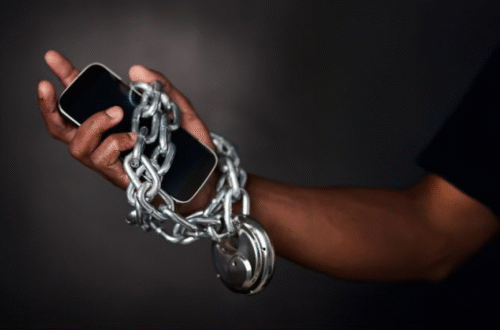
Can we all agree that parenting in Nigeria comes with an unspoken rulebook, passed down through generations?
Because there’s no way you can tell us that they didn’t all attend the same prestigious School of African Parenting, complete with standardised threats and guilt trips.
We’ve all heard the legendary “I’ll flog the stubbornness out of you” delivered with that special Nigerian parent glare, or the emotional “After all I’ve sacrificed for you” guilt trips. These parenting rules have been passed down.
But just because something is so normalised doesn’t mean it’s right. In fact, some of these rules do more harm than good, leaving emotional scars that last long into adulthood.
Let’s take a look at some Nigerian parenting rules that, quite frankly, need to be retired.
This isn’t about disrespecting our parents; they did what they knew with the tools they had. But can we learn from their mistakes and do better for the next generation?
1. Children should be seen, not heard)
There’s an unspoken rule in many Nigerian homes: children are to be quiet, obedient, and never question authority. Speak up? “Keep quiet before I slap you!” Express an opinion? “Who asked you?” Cry when you’re hurt? “Shut up!”
This rule teaches children that their feelings, thoughts, and voices don’t matter. A child who is constantly silenced grows into an adult who struggles to speak up, whether in relationships, at work, or even in defending themselves. They learn to swallow their pain, suppress their emotions, and avoid “causing trouble,” even when they’re being wronged.
A better way? Let children express themselves, even when it’s inconvenient. Teach them how to communicate respectfully instead of punishing them for having a voice.
2. If you’re not first, you’re a failure
In Nigeria, coming second is not an option. Parents proudly declare, “My child must be the best!” Report cards are scrutinised like court verdicts, and anything less than an A is met with “What is this? Do you want to end up a bus conductor?”
But this pressure doesn’t create excellence, it only creates anxiety. Kids grow up terrified of failure, equating their worth with their grades. Some resort to cheating just to avoid punishment. Others develop crippling perfectionism, never feeling “good enough” no matter how much they achieve.
Worst of all? It kills creativity. A child who is only praised for coming first will never take risks, explore new ideas, or discover their true passions. They’ll just chase validation.
Parents should learn to celebrate effort, not just results. A child who tries their hardest but gets a B is not a disappointment; they’re learning. And learning is what childhood is for.
3. The cane solves everything
The Nigerian parents’ favourite “teaching tool”: the koboko, belt, slipper, or “anything within reach.”) The logic is that their parents used the same method and they ‘turned out fine.’ Unfortunately, that’s false. If you think violence is the only way to teach, you didn’t turn out fine.
Yes, discipline is necessary. But there’s a difference between correction and trauma. When a child is beaten for every mistake, they don’t learn why something is wrong, they just learn to avoid getting caught. Worse, they grow up associating love with pain, believing that hurting someone ‘for their own good’ is normal.
Ever noticed how many adults flinch when someone raises a hand too quickly? Or how some parents laugh about “the time I beat my child so hard the cane broke”? That’s not discipline, it’s unresolved trauma.
The logic is that their parents used the same method and they ‘turned out fine.’ Unfortunately, that’s false. If you think violence is the only way to teach, you didn’t turn out fine.
Yes, discipline is necessary. But there’s a difference between correction and trauma. When a child is beaten for every mistake, they don’t learn why something is wrong, they just learn to avoid getting caught. Worse, they grow up associating love with pain, believing that hurting someone ‘for their own good’ is normal.
Ever noticed how many adults flinch when someone raises a hand too quickly? Or how some parents laugh about “the time I beat my child so hard the cane broke”? That’s not discipline, it’s unresolved trauma.) Discipline should teach, not terrorise.
Discipline should teach, not terrorise.
4. My child, my retirement plan
Nothing hits harder than the classic Nigerian parent line: “After all I’ve done for you!” Many of us were raised with the unspoken expectation that we must pay back our parents’ sacrifices, financially, emotionally, and even by sacrificing our own dreams.
Want to study art instead of medicine? “After all the school fees I paid?!” This mentality turns parenthood into a transaction, and children into lifelong debtors.
Kids don’t owe their parents for raising them. Parenting is a choice, not an investment scheme. Support your child’s dreams, and if they choose to help you later, let it come from love, not guilt.
5. “Parents never apologise”
In Nigerian parenting, admitting fault is seen as a weakness. The unspoken rule is clear: Parents don’t owe explanations, let alone apologies.
This creates a dangerous dynamic where children learn that authority figures are never wrong, a problematic lesson in a world where everyone, including parents, makes mistakes.
What’s fascinating is how selectively some parents quote Scripture. They’ll emphatically cite “Children, obey your parents” (Ephesians 6:1), but conveniently ignore the very next verse that commands: “Fathers, do not provoke your children to anger…” (Ephesians 6:4).
Children who internalise that they don’t deserve accountability breed resentment that lasts into adulthood. A simple “I was wrong, I’m sorry” doesn’t weaken parental authority. After all, if we expect children to apologise for their mistakes, shouldn’t we lead by example?
Let’s raise kids who feel heard, not silenced.


)




